by Tanja Jensen
Our memories are stored in the connections between neurons, and while our brain has mechanism to store memories it also has mechanisms to forget. Or stop learning all together. Now, one of the learning mechanisms has been unraveled at a cellular level.
 A research team at Lund University in Sweden studied something called associative learning, by recording activity in ferrets´s Purkinje cells. Purkinje cells are neurons that cause movements, such as blinking. The ferrets learned to associate a specific tone or light beam with a puff of air to the eye, which then blinks. After repeating the procedure of presenting a tone or light beam together with an air puff, the ferrets soon started to blink already when they heard the tone or saw the light – even when no air was puffed at the eye.
A research team at Lund University in Sweden studied something called associative learning, by recording activity in ferrets´s Purkinje cells. Purkinje cells are neurons that cause movements, such as blinking. The ferrets learned to associate a specific tone or light beam with a puff of air to the eye, which then blinks. After repeating the procedure of presenting a tone or light beam together with an air puff, the ferrets soon started to blink already when they heard the tone or saw the light – even when no air was puffed at the eye.
Purkinje cells release the brakes on the active cerebellar nuclei, an output structure in the brain. However, while the signal from the cerebellar nuclei tell the eye to blink in response to a tone or beam of light, their activity also leads to putting the brakes on a different structure altogether, called the inferior olive. This structure leads to blinking in response to the air puff – a reflex – and all the events of activities suggest a loop controlling learning.
This learning is the same type of learning described by Pavlov, when he experimented on his dogs´ drooling. Pavlov rang a bell and then fed the dogs. Soon the dogs started drooling, expecting food, as soon as Pavlov rang the bell. While Pavlov observed the associative learning, many researchers have since tried to tease apart the underlying cellular mechanisms, which the Lund University researchers now have done.
Learning gets worse with two cues presented together
They describe how Purkinje cells learn and forget. Their recordings of the cells´ activity connect them to associative learning. When the team presented the tone and the light together, and at the same time as the air puff, the ferret´s learning to associate the cues with the air puff did not improve. It got worse.
The research team believes the neurons puts the brakes on further learning to save energy, as maintenance of association pathways consumes energy. And the brakes can become very powerful. That results in forgetting.
While the cellular mechanisms of neurons acting as brakes are described for animals in this study, it is not unlikely that the same cognitive process is at play in humans. As such, the finding may contribute to more efficient learning tools.
The study was recently published in PNAS
